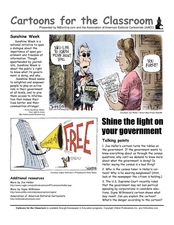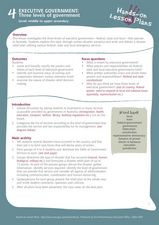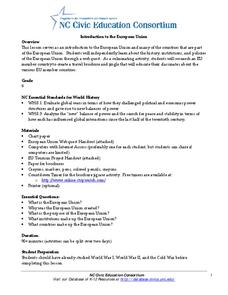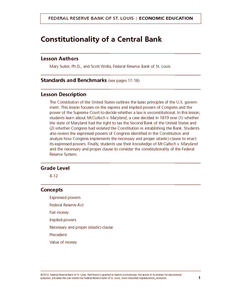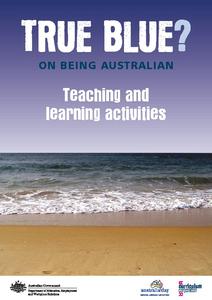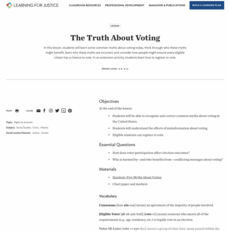Encyclopedia Britannica
Candidate Reflection Essay
After writing about which of the 2020 presidential candidates the class has researched most closely represents their ideas, young political scientists take a 2020 Presidential Election Candidate Quiz to determine what candidate they in...
Center for Civic Education
Constitution Day: What Basic Ideas are in the Preamble to the Constitution?
Young scholars investigate the document of the Constitution as part of a national day of recognition. The lesson plan uses many different activities to dissect the national document to increase student awareness of how the Constitution...
Curated OER
Grandpa' Fight and the U.S. Government
Students are given the United States Constitution, students generate a list on the board of Grandpa's constitutional rights that might help him keep his home and property. Students become "experts," by reading and group discussion, on...
Curated OER
Forms of Government: Ch 1
Assist your class by clarifying aspect of various forms of government. This resource contains 5 true/false and 5 multiple choice questions.
Humanities Texas
Primary Source Worksheet: Theodore Roosevelt, Excerpt from “The Square Deal” Speech
Talk about a timely resource! As part of a series of primary source exercises, individuals read and respond to questions about Theodore Roosevelt's "The Square Deal" speech. Roosevelt reminds us of what our social system should be.
Federal Reserve Bank
Unintended Consequences
What would your class members say to the opportunity to take two years off of school between grades 10 and 11? Examine the economic concepts of costs, benefits, and unintended consequences with this unique and engaging approach.
American Documentary
The Benefits and Drawbacks of Plea Bargains
The outcome of 90 percent of criminal cases in the US is determined by plea bargains. Clips from the documentary Better This World create the backdrop for an investigation of the benefits and drawbacks of the plea bargaining process....
National History Day
Propaganda Posters of World War I: Analyzing the Methods Behind the Images
The power of a picture. During the events surrounding World War I, propaganda posters were widely distributed in American society to sway the emotions of its citizens. By analyzing World War I propaganda posters in the first installment...
Curated OER
Third Grade Social Studies
In this social studies learning exercise, 3rd graders complete multiple choice questions about laws, government, states, and more. Students complete 25 questions.
Curated OER
Cartoons for the Classroom: Shine the Light on Your Government
What don't we know about our government? Explore the concept of transparency and freedom of information throught this analysis handout, in which scholars examine 2 political cartoons. Background information provides context, explaining...
Curated OER
Executive Government: Three Levels of Government
Students identify and classify the powers and responsibilities of all three levels of executive government in Australia. In this executive government lesson, students discuss the various services that the government in Australia...
Curated OER
What's Legal with Music on the Web?
Student research legalities of downloading music from Internet, gather information on citizens who have been charged with downloading/copyright crimes, find out who is working to create new laws dealing with this technology, explore what...
University of Wisconsin
Analyzing Presidential Campaign Propaganda
Campaign propaganda has evolved from 1952 through the presidential election of 2008. A social studies activity prompts class members to analyze the devices used in ads and political cartoons, noting strategies they believe would work to...
Carolina K-12
Create a City!
What is the purpose of a city charter? What services do local governments provide to their citizens? Is there an ideal way for citizens to behave? Approach these often overlooked yet important questions with your class members by having...
Carolina K-12
Introduction to the European Union
What is the purpose of the European Union, and what institutions and countries comprise it? Check out this resource in which class members participate in a student-led WebQuest activity designed to offer an overview of the European...
Federal Reserve Bank
Constitutionality of a Central Bank
Considering the expressed and implied powers of Congress, was it constitutional for the United States to establish the Second National Bank in the early nineteenth century? What is the constitutionality of the Federal Reserve System?
US Department of Commerce
Featured Activity: Exploring Questions for the 2020 Census
Just what is the census for? Using data and census questions, class members explore how officials gather information. Then, they consider how the government uses the answers to determine how it spends its money with a collaborative...
iCivics
Step One: We've Got Issues
What is the most pressing issue in your community? The resource helps you and your middle schoolers begin the process of doing something about it! Learners compare and contrast two pressing issues in their local counties by reading two...
Judicial Learning Center
Judicial Independence: What’s Wrong with This Court?
Why is it important for judges to operate independently of politics or other branches of government? Scholars ponder the question as they examine video clips, case studies, excerpts of the US Constitution, and an interactive computer...
National Australia Day Council
True Blue? On Being Australian
Who or what is an Australian? Discover a plethora of student-centered, engaging activity ideas on the question of Australian identity, organized according to five major themes: people, symbols, place, sport, and words.
Constitution Facts
U.S. Constitution Crossword Puzzles: Expert #1
Who became US Chief Justice in 1801? Which delegate from New York advocated a strict constructionist interpretation of the US Constitution? What is the term given to the chief or one of several import crops regularly grown and sold in a...
Teaching Tolerance
The Truth About Voting
True or False: Only Presidential elections matter. Academics delve into common voting myths to understand what is true and why the election process is critical to democracy. The lesson uses group discussion, activities, and handouts to...
University of Richmond
Renewing Inequality: Family Displacements through Urban Renewal 1950-1966
What is progress? Who bears its cost? High schoolers consider the questions as they review data on families displaced by urban renewal projects in the 1950s and 1960s. An interactive, curated data project asks historians to consider the...
Curated OER
Is Government Necessary?
Learners investigate the purpose of Congress and determine how it affects them. They explain what life would be like without government.











